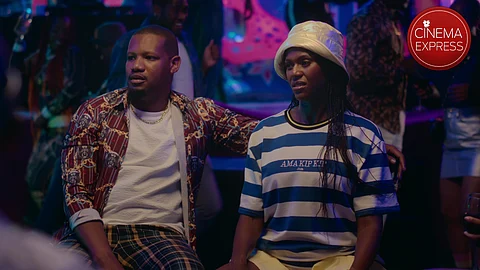Umjolo: Day Ones Movie Review: A flawed film about problematic social norms
Umjolo: Day Ones(2.5 / 5)
Director Fikile Mogodi’s Umjolo: Day Ones is set in South Africa but explores themes that transcend its geographic context—interracial relationships, marital complexities, patriarchal values, cultural expectations, and gender roles. The story follows Jessica (Trix Vivier), a white woman struggling to keep her marriage with Andile (Khumbulani Kay Sibiya) intact. Jessica tries to assimilate into African culture, adopting traditional attire, but Andile’s father is visibly displeased with his son’s choice to marry an “outsider.” His disapproval stems from concerns over their family's legacy and is compounded by his disdain for the couple’s female children, a manifestation of his patriarchal mindset. The family’s preference for Zanele (Sibusisiwe Jili), Andile’s childhood best friend and a native African who aligns with their customs, further isolates Jessica.
Cast: Trix Vivier, Khumbulani Kay Sibiya, Sibusisiwe Jili
Director: Fikile Mogodi
Language: Zulu
Streamer: Netflix
The film’s central question—whether Jessica can navigate this environment and save her marriage—drives the narrative. While the premise is straightforward, the performances anchor the story. Conflict arises after Andile and Zanele’s high school reunion, shifting the narrative focus to their relationship and relegating Jessica to the background. Yet, when the spotlight returns to Jessica, she commands attention. Trix Vivier delivers a standout performance, convincingly portraying both an agitated wife and an insecure daughter-in-law.
Khumbulani Kay Sibiya effectively evokes disdain for Andile, portraying him as an unsympathetic character. Andile’s want-it-all mindset, compounded by his desperate need for his father’s approval, paints him as a man-child devoid of integrity. Though there are moments where we are tempted to empathize with him, his actions ultimately provoke more disappointment than sympathy. His indecisiveness—confessing love to both Jessica and Zanele depending on the situation—reinforces his lack of character.
Zanele, with whom Andile cheats on Jessica, is equally flawed. While she initially regrets her actions and attempts to start afresh, Andile’s outrageous suggestion of polygamy drags her back into the chaos. Sibusisiwe Jili shines in scenes where Zanele’s cunning and hypocrisy come to the forefront, especially when she devises a strategy to enter into marriage. Despite her flaws, Zanele shows glimpses of remorse that add complexity to her character, setting her apart from Andile’s more self-serving nature.
The film falters in its writing, with central characters conforming to predictable archetypes. Key arcs lack resolution—most notably, the fate of Jessica and her daughters is left ambiguous. Jessica’s efforts to shield her daughters from her marital issues and maintain a facade of optimism raise important questions about how she eventually confronts them with the truth and how the children cope. Unfortunately, these threads remain unexplored, leaving the narrative feeling incomplete.
While Umjolo: Day Ones has its flaws—both moral ambiguity and uneven craft—director Fikile Mogodi deserves credit for tackling regressive societal norms that provoke discomfort and spark critical debate. The film may not offer nuanced storytelling or satisfying resolutions, but its willingness to confront deeply ingrained issues makes it a conversation starter.

